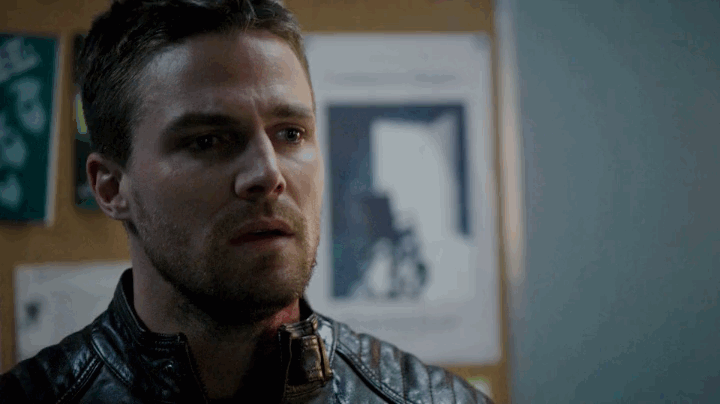
I probably spend way too much time trying to figure out why I love Arrow so much. I recognize that other shows are better plotted, have superior character development, and comment on our culture in ways Arrow fails to. But this show, man. I heart it. It pulls me in with its action and adventure and — perhaps, most relevantly — it’s melodramatic earnestness. The latest episode — Season 3, Episode 20 (“The Fallen”) — is a chief example. It was one of the most Arrow-y episodes of Arrow we have had in a while — which is kind of ironic because it had almost nothing to do with urban vigilantism. But it did double down on this season’s central theme of identity (in case you somehow missed it, this season’s central theme is IDENTITY), while steeping the episode’s awesomely absurd plot mechanics in some serious melodrama.
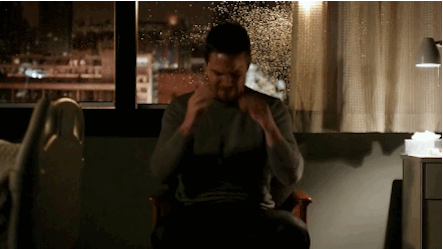
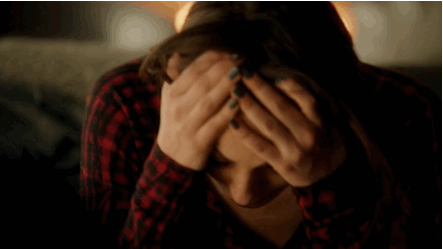
That last point isn’t a criticism. On the contrary, I love melodrama. The way Arrow usually prioritizes sentimentality is one of the things I love best about the show.
DEFINITION OF MELODRAMA (via Merriam-Webster)
: drama in which many exciting events happen and the characters have very strong or exaggerated emotions
: a situation or series of events in which people have very strong or exaggerated emotions
So many of my friends consume media with a narrative distance, in a primarily ironic manner. It seems to be an act of both having one’s cake and eating it, too. The ironic watcher enjoys the work of art through a constant intellectual commentary on it, therefore they can both like it and separate themselves from the ridiculousness of it all. Or so I theorize. I can only theorize because, while I (obviously) enjoy thinking critically about my favorite pop culture, I hardly ever think my way through a show while I am in the process of watching it. In the moment, I am all about the catharsis, the empathy, the feels of it all. While I appreciate campy, self-aware TV drama or comedy as much as the next girl, my heart will always belong to the unironic, earnest, unabashedly sentimental TV dramas.
Supernaturally heightened stakes
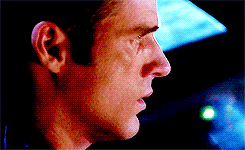
+ awesome characters
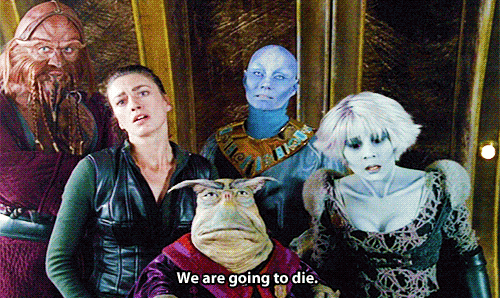
+ earnestness
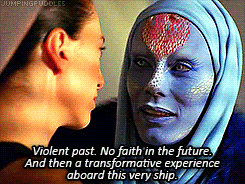
+ feelings
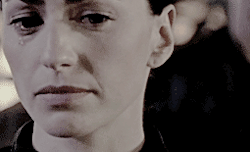
= a recipe for Kayti’s favorite TV shows ever.
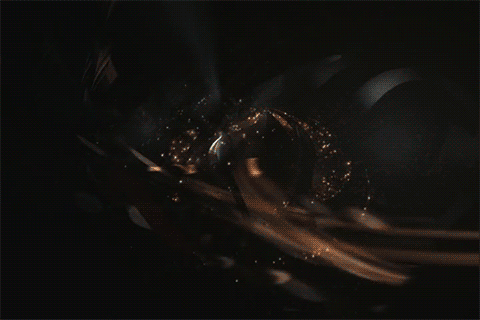
This is why I love Arrow. Because, even when it fails (this city), it takes its melodrama so, so seriously. A commitment to melodrama is built into the very structure of Arrow. How could it not be when the show relies on such exaggerated plot? It commits to the ridiculousness of its reality through the truth of its characters and I can relate to that commitment. The more absurd the plot, the more heavily TV shows must rely on consistent characterization and those pesky feels to tell a relatable story. (At least for I, the unironic watcher, to be able to enjoy it.) In other words, it doesn’t matter how absurd the plot is as long as there is truth in the characters’ reactions — both to the plot and to one another.
This last point is how Season 3 of Arrow has been, at times, failing. Arrow has been hitting all of these compelling, A+ marks in terms of melodramatic plot — Sara is dead, Oliver is dead again, Oliver is alive again, etc. — but it hasn’t been giving us the time to dwell on the characters’ reactions to these major moments in the same way it did in Season 2. And, when it has, that reaction has often felt less like emotional truth and more like character in the service of plot. The best stories reverse that dynamic: plot in the service of character, something Arrow sometimes seems to forget in its current season.
Exhibit A: Diggle’s reaction when Team Arrow suspected Roy might have killed Sara under the lingering influence of mirakuru…
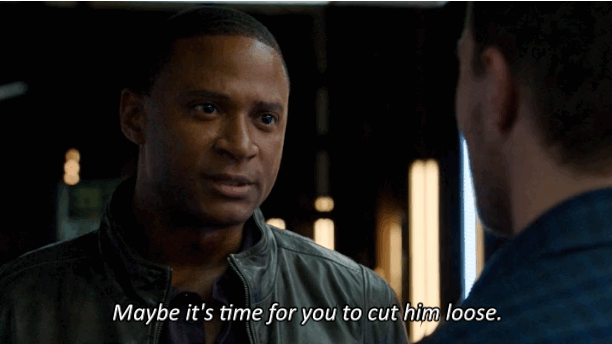
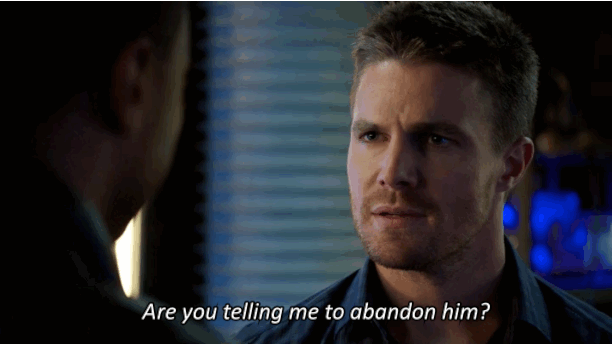 (Oliver is confused at Diggle’s out-of-character response. As are we, Oliver. As are we.)
(Oliver is confused at Diggle’s out-of-character response. As are we, Oliver. As are we.)
While that first example illustrates a particularly egregious example of Arrow‘s Season 3 habit of placing plot over character, here’s an example of Arrow‘s reluctance to spend time on sentiment.
Exhibit B: Oliver and Diggle are reunited following Oliver’s return from the presumed dead…
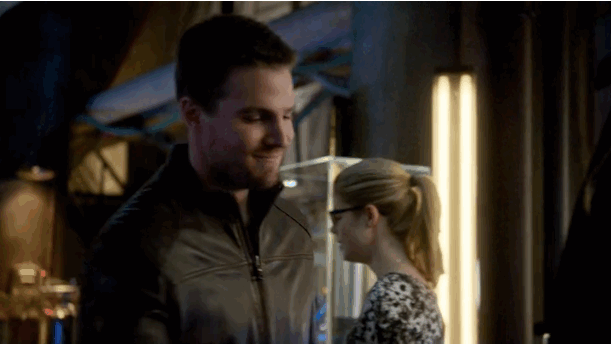
Geez. What’s a fella gotta do to get a hug around here?
It’s little moments like these that avoid honest, believable emotion that have made watching Season 3 so damn frustrating. Arrow has been setting up the pins perfectly, and then only knocking down like three or four of them. “The Fallen” probably knocked down about 7, but the three they left up are spread out in a way that is impossible to knock down unless you’re an expert bowler. (Have I extended this metaphor too far? Nope!)

Someone get this hedgehog on the Arrow writing staff!
“The Fallen” embraced melodrama in its opening sequence. After watching last week’s episode, I was worried that Arrow would jump ahead to Thea already in the hospital, skipping over Oliver’s immediate reaction to his sister’s grave injuries. Because that’s the kind of shoot-yourself-in-the-foot decision Arrow has been making all year. But, nope. Instead, we got this heartrending gloriousness…
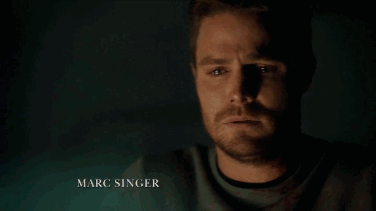
Watching Oliver find Thea, bring her to the hospital, and start to realize that she won’t be OK was great television. We were allowed to dwell in the terrible, emotionally honest aftermath of Arrow‘s latest melodramatic plot decision. We have needed to see more moments like this over the course of the season — from everyone, but most especially from Oliver who has been like a dense block of sexist, controlling, hypocritical wood this season. This isn’t a comment on Stephen Amell’s acting — I sinceriously think he is great and anyone who disagrees can come at me — but a comment on the lack of emotional growth or honesty Season 3 has allowed him. And, yeah, I get it. Oliver is an emotionally closed off dude, but those moments don’t have to occur between Oliver and another character. They can occur between Oliver and the viewer. Here are a few examples of what that looks like…
Oliver looking at what he wants, but thinks he can never have…
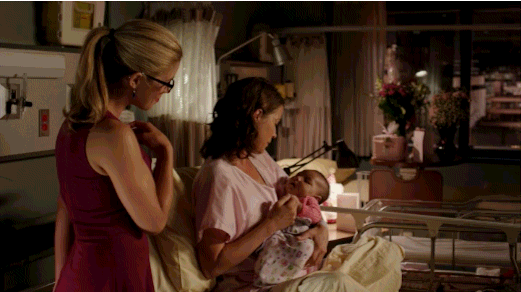
Felicity thinking about Oliver after his presumed death…
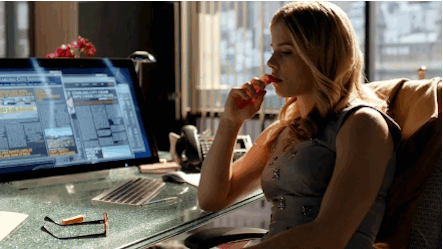
Malcolm listening to Thea talk about how much she hates him.
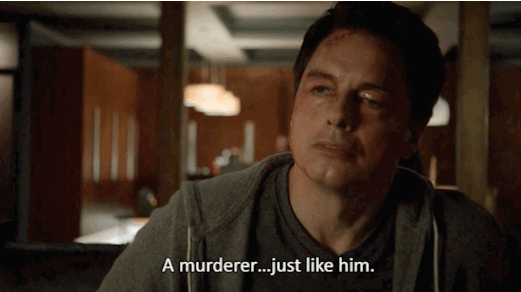
But for every moment that has prioritized a character’s emotional development this season, there were others that prioritized something else — to Arrow‘s narrative detriment. This unfortunate habit continued in aspects of “The Fallen.” For example, there were some great Olicity moments, but — for me — the sex scene wasn’t one of them. My friends over at Head Over Feels wrote a great piece that breaks down why the Olicity sex scene didn’t work for them…
It didn’t have the deep meaning that it needed to…especially in the aftermath. Really? You’re going to have Felicity say “Well that happened?” As if it was not completely calculated? I don’t care how socially awkward she is, NONE of that rang true. Not if Oliver is the man she loves with every fiber of her being. I don’t buy it. This should have been EVERYTHING…and it wasn’t.
I won’t go into it too much here, but this scene felt very emotionally distant to me — or, at least, not emotionally raw or honest. The Olicity dynamic has been frustratingly redundant this season, with Oliver continuing to push Felicity away. Though, physically, he didn’t push Felicity away in Nanda Parbat, emotionally, he still continues to be largely unavailable to Felicity.
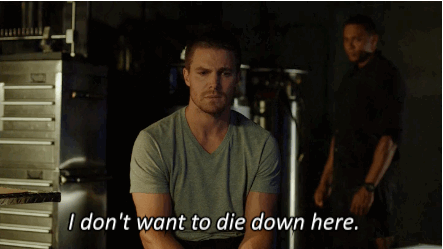
“Then don’t, Oliver.” This was EPISODE 2!!!
Sure, he has told her that he loves her, but he has never once chosen her and that kind of sucks. Not only for Felicity, but for us viewers who are watching the same thing happen over and over again. Robert Dougherty over at The Movie Network did a pretty great breakdown of this narrative issue in his review of “The Fallen.”
If sex wasn’t going to make [Oliver] budge on that even a little, at least enough to hold on or hope to come back before giving up Oliver Queen anyway, then I really don’t see the true point in putting it in at all, other than to pacify us. If I had the choice, I would take one little lasting moment of Oliver being changed by sex enough to want and fight for something different, and to vow or hope to actually come back later and do things different — even if he then failed to stop Ra’s from making him evil first anyway — over all the explicit sex the CW could get away with. Perhaps I was a fool to think we could really have both — but I am not a fool for valuing sex the least out of these two choices, that much I know.
For me, moments like Olicity’s goodbye scene at the end of the episode and Oliver opening up to Felicity about Those Five Years were much more moving than the sex scene turned out to be.
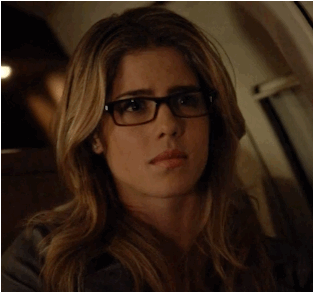
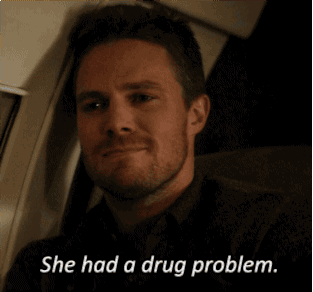
The sex scene seemed to prioritize an attempt at sexiness rather than the raw emotion this dynamic deserves (not that these two things are mutually exclusive). Furthermore, Felicity’s confession that she, too, loves Oliver was great to hear, but didn’t change anything for Oliver. Narratively, this sex scene and the brief moments of emotional intimacy in this episode weren’t all that different from Olicity’s earlier scenes this season in the respect that Oliver continues to choose The Arrow.
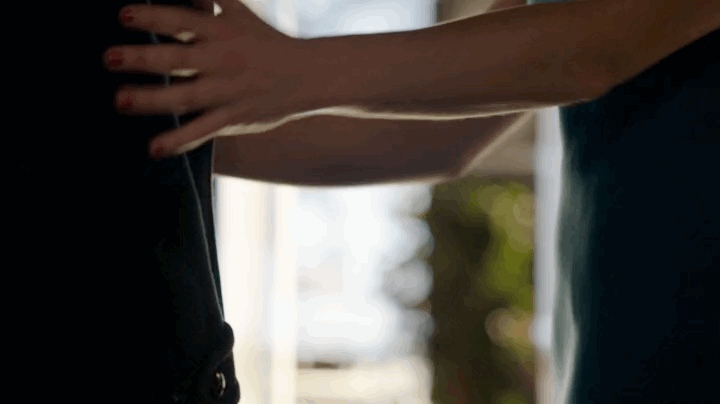
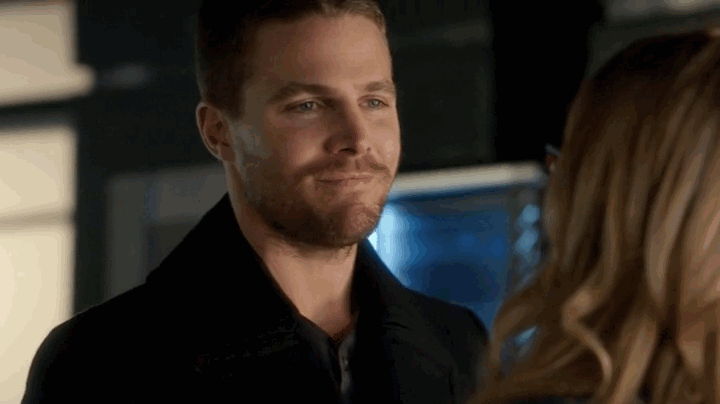
A few episodes ago, I wrote that it seemed like Oliver’s story arc was finally taking a thematic turn. Sadly, this doesn’t seem to be the case. With only three episodes left this season, this show is going to have to make an about-face with this character. I’m afraid that, even if it is somewhat satisfying, it will still feel abrupt and, therefore, disappointing. This shouldn’t happen in a network show with 23 episodes to flesh out a narrative arc. Still, this was a slightly better episode for both Olicity and Oliver’s emotional intelligence. More, please.
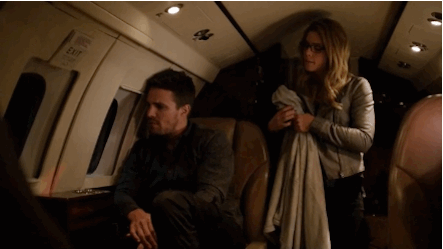
In watching Season 3 of Arrow play out, it’s hard not to think back to Episode 20 of last season — aka the one when Moira died. Gulp. It was a dark, tragic, unpredictable time, made even more compelling by the flashback sequence post-Moira’s present-day death that had Oliver’s mother comforting him following the (fake) news that his baby mama had miscarried.
Fanvids, one of the truest of sentimental art forms. This one by eemersonm is full of feels. You have been warned.
This storyline sounds crazy, but — in only a way that Arrow can pull off — it lined up emotionally with the present-day stuff. Something that “The Fallen” definitely didn’t even attempt to do with its flashback sequences. In Season 2, Episode 20, after watching Oliver watch Slade stab Moira through the heart, we get a sweet scene in which Oliver tells his mother he has no idea what he would do without her. This should be (and, if we’re being honest, is) a little bit emotionally manipulative, but it also feels earned. Moira hugs her son and tells him that she will always be there for him and it is all done so well. I’m not going to dwell too long on the way the flashback sequences continue to work against what Arrow is trying to do in its central plot, but it felt especially problematic this episode.
Dear flashback, Not now. Love, everyone.
— Superhero Feed (@SuperheroFeed) April 23, 2015
I’m worried about how this storyline will play out moving forward. While Arrow has spent the last few episodes faking us out with almost character deaths, last season, the show spent that time very effectively raising the stakes. Moira’s death at the hands of Slade Wilson not only served as an emotional catalyst for the season’s final sprint, it grounded Arrow in some relatable tragedy. The following episode picked up with this montage of the Arrow characters reacting like regular, human people to the tragedy.
I still listen to “Somewhere Else” by the Indians on repeat when I am feeling melancholy.
There was funeral-going and sunlight-despite-the-death and people like Detective Lance putting aside his differences with the Queen family to pay his respects. Sure, Oliver was off avoiding any and all feelings, as is in-character for him to do, but the moment was given some time. Arrow is going to have a harder time pulling off this kind of emotionally-grounding twist with Oliver’s turn to Al Sah-him. If they double down on Team Arrow’s emotional reaction to the loss of a loved one as they seem to be doing in this scene from the next episode, then they might be OK.
https://www.youtube.com/watch?v=RNBLNTPju4M
However, Season 3 has seen a culling of many of the “normal” life signifiers Arrow depended on in Season 2. Watching Oliver struggle to run a multi-billion-dollar company wasn’t the most relatable dilemma ever, but at least he had an office job. He may have lived in a mansion, but at least it was a house with some kind of family in it. These were things that the viewer could relate to, backdrops that kept the more supernatural drama grounded. I’m not sure how I can relate to this…
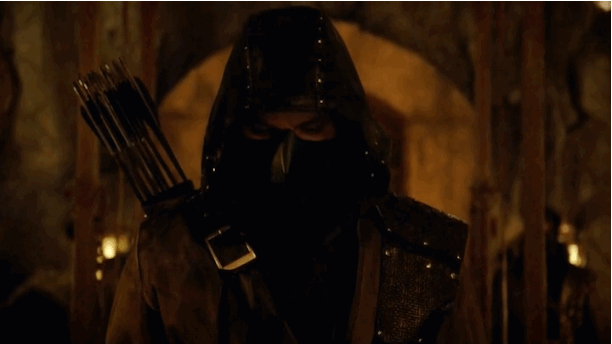
That isn’t to say I have to relate to the situation to enjoy it, but I do have to see recognizable emotions in the characters who are living it. I am excited to see this storyline play out and the stakes do feel suitably heightened. However, the character work in this show needs to be that much better if it is going to try to pull off a brainwashed assassin storyline.
For me, Diggle was the unsung hero of “The Fallen.” Backing up Felicity in her belief that Oliver cannot join the League of Assassins. Going along with Felicity’s crazy non-plan to sneak a drugged Oliver out of a fortress filled with assassins. Having absolutely zero reservations about using the memory of Maseo’s dead son to try to guilt him into helping Oliver…
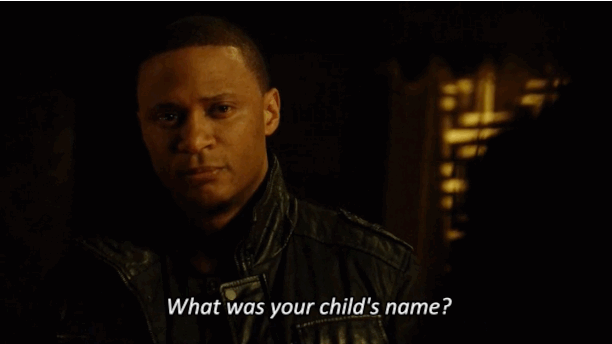
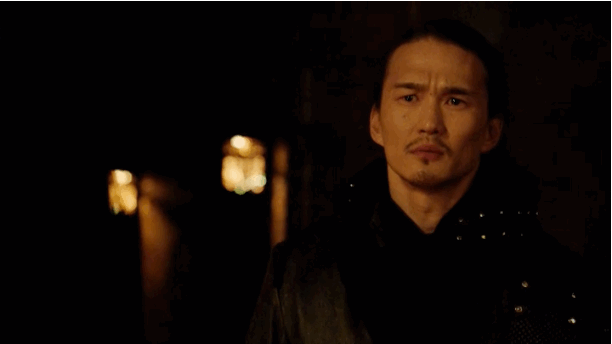
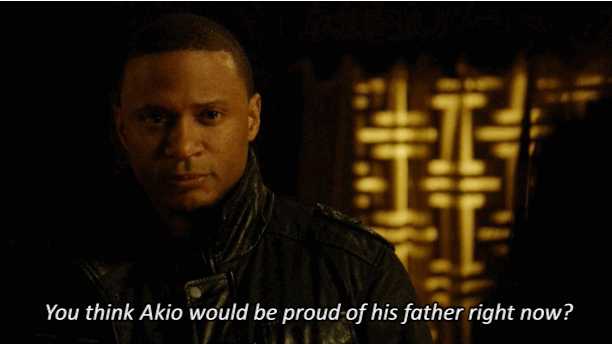
Poor Akio… But, lol.
Diggle’s conversation with Maseo directly relates to his character’s (mostly) consistent, refreshing story arc this season. In what has been depicted as the alternative to Oliver’s choice to eschew his real-world identity and all of the complicated responsibilities that go along with accepting “normal” life, Diggle has chosen his family. He has chosen to face the unique complications that go along with trying to have a family when you are also part of a vigilante team (or, you know, ever). This came shining through in his description of The League of Assassins he gave to Maseo…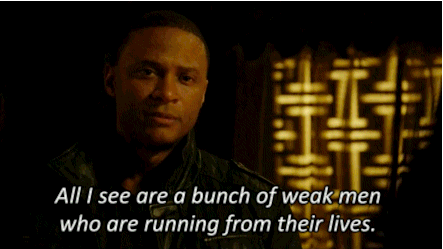
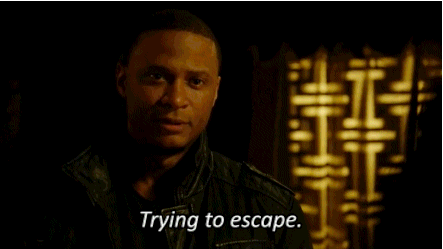
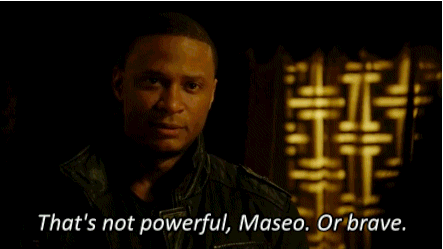
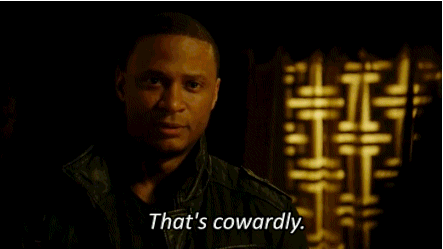
Um, awkward…
I know that Oliver’s decision to join The League isn’t quite as simple as him choosing unfeeling duty over the messy vulnerability of emotional courage, but — on a show with all of the thematic subtly of a sledgehammer — it kind of is. When Diggle and Lyla realize that their similar lifestyles threaten the security of their daughter’s future, Diggle is willing to quit Team Arrow if he has to. But it isn’t Diggle’s willingness to quit that makes his character so strong, it’s his character’s willingness to face these complicated, tough emotional issues in the first place. It’s something he has in common with Felicity, and one of the major reasons why both characters — especially Felicity, who is more often the show’s poster child for emotional intelligence — are so darn likable and compelling. Especially in comparison to Oliver. Because emotional honesty is his Achilles heel.
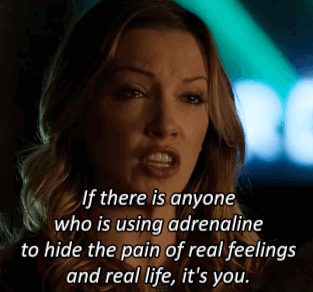
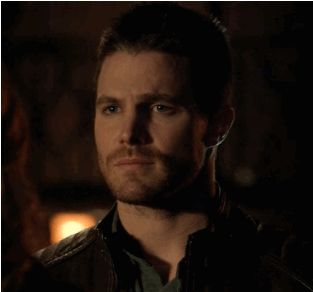
Word, Laurel.
Oliver will go into a fight that he doesn’t think he can win or turn over his soul to the League of Assassins to protect the ones he loves or, but ask him to sit down and talk about how he’s feeling?

And that’s the difference between Diggle and Oliver. Diggle is strong enough to love openly. He is willing to risk losing so that he can have. Oliver isn’t. And it’s totally understandable given everything Oliver has been through, but that doesn’t make Diggle’s emotional intelligence any less refreshing in a television landscape filled with emotionally-dumb heroes. This episode was compelling because Oliver, in the limited way he is able to, actually showed some emotional vulnerability.
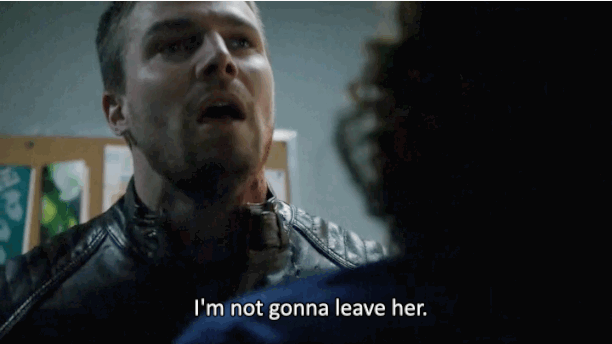
But, even so, that emotional vulnerability came about mostly because he didn’t have a choice. Not because he decided that emotional courage might be a way forward. Because he had been broken down by R’as. And you can see how that is problematic because, in this scenario, emotional vulnerability is equated with failure. It is Oliver’s last resort, part of his farewell tour.
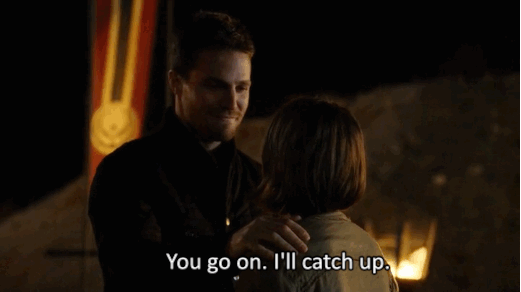
Sure, Felicity and Diggle can exhibit emotional vulnerability and honesty, but they are not the heroes of this story and that makes all of the difference in terms of what this show is telling us about the all-too-common Emotions=Weakness trope. Oliver, as the protagonist, must continue on his lonely, tortured, man-pain path. For him, emotional vulnerability is a luxury he doesn’t have. A weakness, rather than a strength. Which is where Arrow continues to fail this season — at least, in my eyes. The tired trope that Emotions=Weakness has been played out ad nauseum in so many TV shows and is still so prominent in our culture that, even when Arrow is using one character (Diggle) as a mouthpiece to challenge it, it is using its main character (Oliver) to reinforce it. Because, even when Oliver is telling everyone who will listen that he loves them, he is still choosing the path of least emotional resistance: The Arrow. And this is where my lingering sense of disappointment with Arrow Season 3 has been coming from. Because it has set itself up to tell a different story — a bolder, less-well-worn story — and it just won’t let itself tell it.
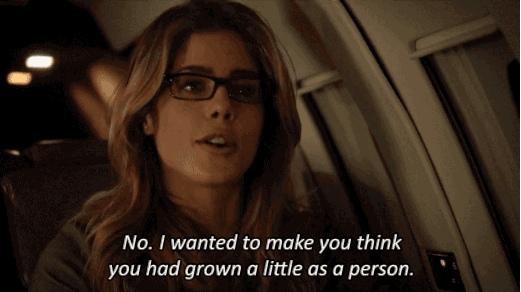
Felicity, kind of summing up my opinion of what the show is doing with Oliver’s emotional growth (or lack thereof).
Like all serialized television shows, we will have to wait until the end of the season to see where Arrow falls on these questions of emotional vulnerability, melodrama, and identity, Presumably, Oliver will end the season embracing his “Oliver Queen” persona. After all, the final episode is titled: “My Name is Oliver Queen.” But, given all of the storytelling missteps Arrow has made this season, it may be too late.
What did you think of “The Fallen” and Arrow Season 3 in general? Do you watch Arrow for the feels, or do you tune in for another reason? Sound off in the comments below!

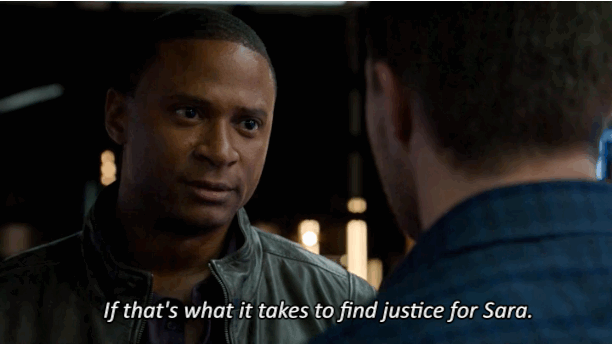
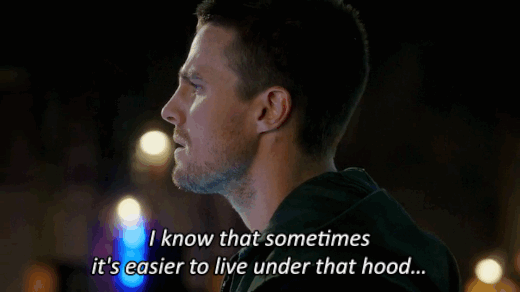
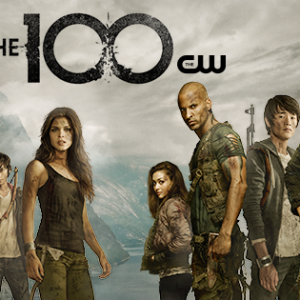
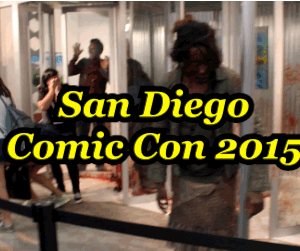
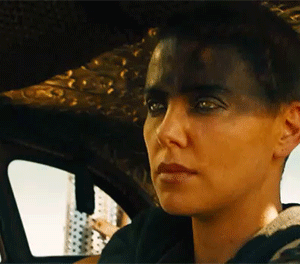
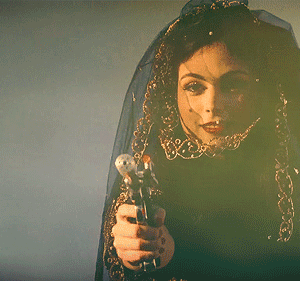
Leave a Reply